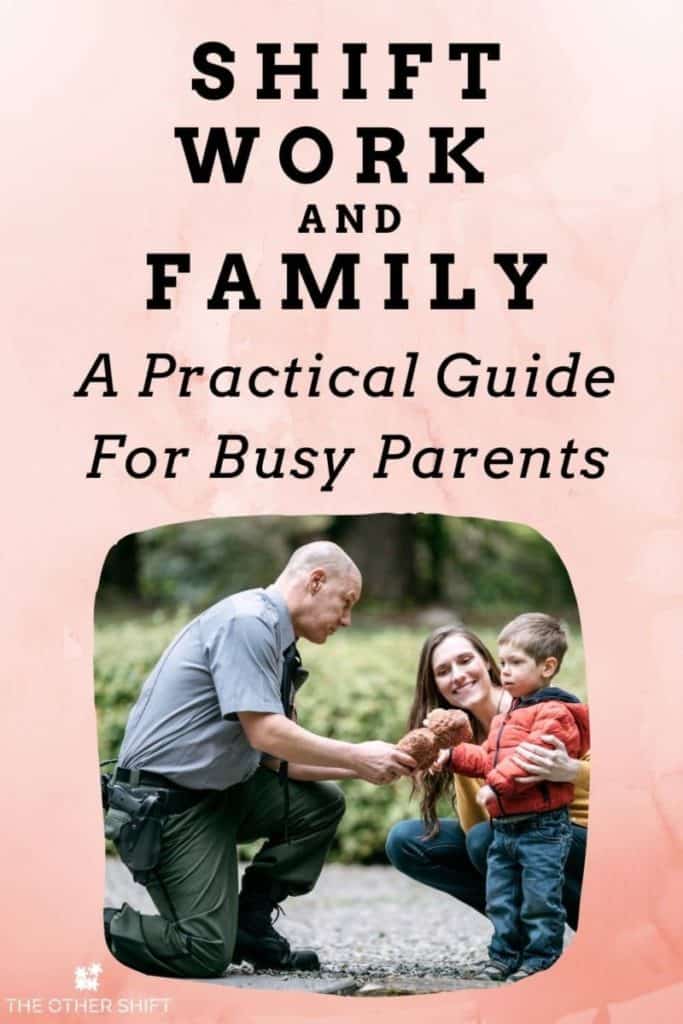Disclosure: This page may contain affiliate links, meaning we receive a commission if you decide to make a purchase through our links, but this is at no additional cost to you. Please read our disclosure and privacy statement for more info.
If you have ever worked an all-nighter before rushing home in time to send the kids off to school, you know first-hand that balancing shift work when you have a family can feel like a juggling act. Of course, we love our families, but as shift workers, most are also passionate career professionals too.
The key to balancing shift work with family-life is to maximize the quality time you spend with your family, while also making sure your individual needs are met. There will be challenges, but if you are armed with a positive mindset and a decent support network, your family can actually benefit from your non-traditional work-life.
I want this article to be a source of encouragement for shift works who are actively trying to strike a work-life-family balance. To that end, this post is packed with wise tidbits to help you manage each and every day, creative ideas to help you stay connected and some real-talk about possible challenges.
Balancing Shift Work with a Family
Whether we have kids at home, or not, as shift workers we all have to be proactive about striking a work-life-family balance and that takes a certain degree of flexibility, creativity and planning. That’s why these three things should be the main pillars of any sound strategy for managing shift work when you have a family.
Flexibility
As professionals with a non-traditional work schedule, we are practiced at being flexible. We can cope easily when we have mandatory overtime sprung upon us, we don’t even bat an eye when we have to celebrate holidays a few days early, or late, and some of us are even conditioned to adapt our daily routines around ever-changing work schedules.
In other words, there is already at least one tool in your toolbox that will help you find a balance between work and family.
Part of flexibility is being open to change and the ability to roll with the punches, which is an important part of having a family.
Related post: One Parent Works Days, the Other Nights. It’s Hard, But Not Impossible
Creativity
A little creativity will go a long way to help you find ways of balancing work and family. Sometimes, all you have to do to maximize the quality time you get to spend with your family, is think outside the box. Here are a few creative ideas that we have collected from shift workers who balance their work-life and family-life in style.
- Video chat your family on breaks: If there is one thing that 2020 has given the world, it is access to great video-calling technology.
- Go home during a break, if possible: This won’t be possible for everyone, but if you do happen to live close to work, consider going home during your break.
- Have your family come to you: If your employer is okay with it, you can invite your family to come visit you during your shift, or at least your break. This works especially well if you have a job that requires you to wait around.
This tip comes from a friend of mine who used to visit her dad at the Ambulance company he worked for. They could have dinner together, and he would pop out if he got a call.
Related post: Working 2nd Shift With a Family: How to Remain a Solid Unit

Proactivity and Planning
Despite the fact that we must be flexible, some things, even in our lifestyles, are set in stone. We will always need to eat, for example. And there will always be some pesky household chores, like laundry, that we must attend to.
Having a plan in place to accomplish these types of daily tasks can help you attack them more efficiently, leaving you with more time to spend enjoying your family.
- Meal Planning: Meal planning is one of the best ways to take the thought and stress out of daily tasks. Taking the guess work out of answering “what’s for dinner?” will help set you up to enjoy mealtime with family.
Meal planning can be as simple as figuring out a menu for the week or you can take it a step further and meal prep ahead of time, so you don’t have to worry about it on work days.

Tip from a fellow shift worker: My friend used to meal prep lunches for the whole family ahead of time and put little notes of encouragement into their lunch boxes. For more heartfelt tips like this, check out this post.
We also recommend delegating meal-related responsibilities where you can. Remember you don’t have to do it all on your own.
- Have a chore schedule and stick to it: Instead of letting the chores pile up, which can also cause the stress to pile up, try to spread your chores out over the course of the week so you can tackle one or two per day.
Setting up a chore schedule is also a great way to delegate chores to your partner or older children and set expectations that will help you defend your rest.
- Set aside family time: When you do have time off, try to set aside a whole day, or at least a half-day that is designated family time. Use this time to really be present and enjoy your family’s company.
- Plan for important family events ahead of time: If you bid for schedules (aviators, I’m looking at you), you may not always be able to guarantee your presence at important family events, like birthdays. But you can at least try to get the time off.
This kind of proactivity at least shows family that you do your best to prioritize them.
Related post: 9 Shift Work Best Practices You’re Probably Not Doing

Managing Shift Work with Children
Several studies have shown that children actually benefit when one or both of their parents work a steady shift (source) and there are benefits for the parents as well.
Shift work creates a more equitable distribution of parental responsibilities because it forces both parents to take an active role, which benefits children by providing them with an opportunity to forge strong attachments with both of their parents.
According to this study, kids benefitted the most when one parent had a steady evening or night shift, while the other worked during the day. This sets up a shift-like schedule for the parents and ensures that the kids are almost never home alone. Which, incidentally, can help you save money on childcare!
That said, the study stresses that parents in this situation must prioritize their wellbeing. (More on that topic to come.)
A quick note: we know that not everyone gets the opportunity to raise their kids in a two-parent home. If you are a single parent and a shift worker, we see you. You are not alone, and we hope that the following honest discussion of the challenges you may face, as well as, some possible solutions, will help you better manage shift work and parenting.
We wrote a post specifically for single shift working parents which you can read here. I truly hope it offers some tips and motivation because you are doing a phenomenal job.

Managing Shift Work with a Baby
Brining a newborn baby into your family is always a big transition.
One of the biggest challenges any parent faces when they bring home their brand-new baby is getting enough sleep. That will be especially true for the shift worker in your family.
One strategy to make sure you are getting enough sleep is to designate certain times that are yours for sleep. During that time someone else, be it your partner, a grandparent, or a friend should look after the baby, giving you a chance to actually get some sleep.
It is better for both parents to get quality sleep, even if it is a different time, than for both of you to be exhausted and fighting over “whose turn” it is to check on the little one.
The other challenge will be childcare.
Unless you work a shift opposite to that of your partner or have the financial means for one parent to stay home, you will need to arrange for someone to care for your child while you work. This is where using your resources comes in again.
A 911 dispatcher once told me that it “took a village” to raise her children when they were young. “My dad retired when my oldest daughter was born. I don’t know what I would have done without him,” she admitted.
This anecdote shows the importance of relying on family to help you. Oftentimes, grandparents are more than happy to pitch in and provide free child care; all you have to do is ask.
Related posts:
- Does Shift Work Affect Fertility? What You Need to Know
- Shift Work While Pregnant: Survival Tips from 46 Busy Moms

Managing Shift Work with Young Children
The challenges of managing shift work while parenting a young child are quite similar to the challenges of having a baby at home. It can be hard to get sleep after a shift, if your four-year-old is in the next room throwing a tantrum. And, while you may be able to take your young child to daycare or school, you still have to figure out ways to physically get them there.
The best advice we can give is to rely on your villagers for help.
For example, you can use playdates to your advantage. Getting your young child out of the house to play at a friend’s might help you get the nap you desperately need. You could also explore carpooling options that would help you get your child to daycare when you aren’t available to drive them yourself. The idea being, you return the favor when you are free.
One issue a number of shifts working parents run into when they work night or evening shifts is the unavailability of childcare options. Childcare centers and preschools that offer overnight, or extended hours are rare and often have long waitlists. (If you are thinking about starting a family, this is your que to get on a childcare waitlist now and get ahead of the curve.)
One creative work around to this problem is to babysitter or nanny share. Yes, that is a thing people can do!
The idea is, you and a colleague hire one babysitter to watch both of your children. This is also known as a babysitter co-op (source). Taking this approach can make in-home childcare financially competitive with other childcare options. Not to mention, your young child will be given more and likely, higher quality attention from the shared nanny.

Managing Shift Work with Older Kids and Teens
Older kids and teens present entirely different parenting challenges than babies or young children. At this point in their developmental process, your kids will most likely be able to respect your need to sleep and will even be able to get themselves to and from school.
If you are blessed with a responsible teenager, you may not even need to worry about hiring a babysitter anymore. So what challenges does that leave? Finding quality time to spend with your kids is a challenge when they get older.
Either you will work while they’re home from school, or they will decide to spend time with their friends instead of you.
Navigating the adolescent need for independence when you really just want to spend time with your child can be tricky, and advice in this realm is probably best given by someone who has professional credentials, like a family therapist, but here are a few ideas we were able to put together.
- Prioritize their important events: It won’t always be possible but the best way to connect with your child and show that you care is to be there for their important event.
- Find a common interest / hobby: If you can find something to do together that you both enjoy, they might just choose to hang out with you.
- Make family meals mandatory: Family meals are an important way to spend time together. They give you a chance to catch up despite busy lives, make sure your older child / teen knows that they are expected to attend.
- Be the favorite hangout spot: My friend makes it her mission to be the house her son’s friends all come to. They even have tea all together with her when she is home. (It helps that she’s a flight attendant and bribes them with exotic snacks from around the world…)
Related: Working Night Shift With Kids: How To Maximise Family Time

It Takes a Village
In the section above we briefly mention that it can take a village to help you raise your child but what exactly do we mean by that?
Your village is your support system, it will be the people you turn to when you need a little help raising your kids. Potential villagers include family and friends, co-workers, and hired help.
- Family: If you are lucky enough to live close to kind, loving, supporting family members, let them help you!
- Friends: Sometimes our friends are our chosen family, and if any of your friends happen to love kids, use that to your advantage and let them help you!
- Co-workers: Going back to the babysitter co-op, some of your co-workers may have families too, in that case you can help each other. If your workplace has a “casual pool” you can join it to try to get more schedule flexibility, which can also help.
- Hired help: If you have the means, it might be worth it to hire some extra help. Whether that is a babysitter, housekeeper, laundry service, or landscaper, if you can get do something to lighten your load, or take off a little pressure, do it.
Your villagers are your back-up. Did you get assigned mandatory overtime? – Call your sister and have her pick your kid up from preschool! Do you and your partner feel like ships in the night? – Send the kids to grandma’s house for the week so you can spend some quality time together!
As they say in flight attendant training, use your resources! Rely on your crew! (or Villagers!)

Communication is Key
When you are balancing a nontraditional job schedule with parenting, you absolutely have to communicate with your partner, kids, and your manager / boss. You also have to be honest and realistic.
If something isn’t working you must speak up! But you also have to recognize that you will experience challenges, and that’s OK!
No one expects you to strike the work-life-family balance alone, or overnight. You have your villagers to help you, as we just discussed, but for them to support you have to be able to communicate with them.
Communicating with your partner
It goes without saying your that partner is part of your family, and much of the parenting-geared advice we gave you so far also applies to your relationship to them. Setting aside time to spend with your spouse will help you stay connected.
Communicating with your partner will help you stay on the same page as far as parental responsibilities go. The last thing you want is to have your daughter stuck at basketball practice because you didn’t talk about who was picking her up.
Modeling good communication skills and empathy with your partner will help your kids develop into more emotionally intelligent adults and equip them with important life skills and coping mechanisms.
Related posts: If you need advice about maintaining your romantic relationships as a shift worker, this one will help keep the love alive, this one has some great date ideas and this one is specifically for the shift work wife.
Communicating with your kids
As your kids get older you can talk to them about your lifestyle too. It can be really helpful to make sure your kids understand what your work-life demands and set expectations. Some topics that you might want to consider talking about include:
- What your job entails: Kids are naturally curious and will wonder about what you do at work. It’s important they know what you do, why you do it, and why your lifestyle might be different from their friend’s parents’.
For example: Always tell your kids when you expect to be home and, if you can, tell them a little bit about what you will do while you are gone.
Bonus: If you are going to be gone overnight you can give your child something special to let them know you will be back. Especially when they’re younger, this gives them a concrete thing to focus on. “Mommy / Daddy will come back to collect their ring, so I know they haven’t left forever.”
- Sleep: Explain to your kids that they need to let you sleep before or after your shift. Designate an alternative adult (partner, co-parent, village member) that they can turn to for help should they need it.
For example: If you have to day-sleep for a few hours before work, you might tell your kids to let you sleep and call their grandma if they need help.
For help in creating the ultimate bedroom oasis click here and for tips in falling asleep fast, check this post out.
Bonus: Setting healthy boundaries will help your kids learn to do the same.
- Emergency protocols: If you have older kids who you feel comfortable leaving home alone, you will want to make sure they know what to do and who to call in case of an emergency.
For example: Should, heaven forbid, your home catch fire while you’re at work and the kids are home, make sure they know how to contact the fire department, and designate a safe place for them to go.
Bonus: Even if you are leaving your kids with a nanny, preparing them to respond in an emergency will help them to better cope with the stress of an emergency situation.

Communicate with your manager / boss
Most employers who operate shift-oriented industries understand the demands they are placing on their employees and will have policies and programs in place to help alleviate some of the strain.
Having a sit down with your manager / boss simply to ask, “what supports do you offer families?” can be highly beneficial.
In the US, for instance, some employers have scholarship programs set up to help their employees afford college or may have language based on the Family / Medical Leave Act (FMLA) that protects employees from repercussions if they have to call out due to their caretaker responsibilities.
The more you know about the support systems available to you, the better equipped you will be.
Prioritize your Wellbeing
I did not want to relegate this topic to the end of this post because your wellbeing is truly one of the most important elements of a good work-life-family balance.
If you have ever watched the safety demonstration on a flight you know that the flight attendants always instruct you to put your own mask on first, before helping others, because you won’t be any use to your child if you’re hypoxic. The same applies when it comes to addressing your basic needs.
When your basic needs are not met it becomes a family affair because if you are tired, hungry, or emotionally burnt out you will not be able to fulfil your family responsibilities to the best of your abilities. You also will not be able to make the most out of the time you do get to spend with your loved ones.
You need to make sure you get:
- Enough rest: we have so many posts about getting enough sleep as a shift worker, so to say we think it’s important, might be an understatement.
- Enough to eat: we can’t be good parents, spouses, or employees when we’re hangry. It also helps to eat healthy! (Here are some vegan snacks if that floats your boat and here is a post all about intermittent fasting which can be a very effective meal schedule technique for shift workers.)
- Enough “me time”: establishing a self-care routine and setting aside some time for you to check in will prevent you from getting emotionally burnt-out, which benefits your family too.
The two pictures below show simple ways I look after myself just that little bit better.
The photo on the left is my holding a canister of SuperGreen TONIK which is by far the tastiest and most effective green juice I’ve tried (see here for my full review).
While the photo on the right is again me wearing a pair of blue light-blocking glasses which has stopped eye strain and help me sleep. Both of these products are well worth the investment if you’re looking for somewhere to start.


Summary: Shift Work and Family. Practical Guide For Busy Parents
When you encounter challenges finding your work-life-family balance, remember there are some truly unique benefits to working a shift job.
Your work is limited to your shift, you cannot take it home and let it encroach on family time.
Ninety-percent of the time you will be free at the end of your shift. Excluding the occasional mandatory overtime, or unforeseen delay, you aren’t expected to agree to “afterhours” commitments, meaning you can set better work-life boundaries.
We know that striking a work-life-family balance is challenging when you work in shifts, but you can make it work. We hope this post has provided you with encouragement, and maybe even some fresh perspectives.
Cheers,

Disclosure: This page may contain affiliate links, meaning we receive a commission if you decide to make a purchase through our links, but this is at no additional cost to you. Please read our disclosure and privacy statement for more info.
Resources
- MedicineNet. “Parents’ Shift Work Can Be Good – or Bad – For Kids.” Jun. 25, 2018. Web.
- Lockhart, Stephanie. “To the Shift-Working Parents, I See You.” Her View from Home. Web.
- Kid Spot. “This is how working irregular hours can actually be good for your kids.” Parenting. Jun. 25, 2018. Web.
- Matheson, Annabel PhD, RN, Louise O’Brien PhD, and Jo-Anne Reid PhD. “Women’s experience of shift work in nursing whilst caring for children: A juggling act.” Journal of Clinical Nursing Vol. 28, No. 21, (2019). 3817-3826. Web.
- Lincolne, Pip. “Balancing shift work and babies: How one family tackled the juggle.” Babyology. Web.
- Inter Dynamics. “Focus on Fatigue, Issue 40: Shift work and the family.” Focus on Fatigue. Mar. 10, 2016. Web.
- Anderson, Lucy. “The impact of paramedic shift work on the family system: a literature review.” Journal of Paramedic Practice. Aug. 2, 2019. Web.
- Maija. “Shift Work – Does it Work? How to Raise a Family when Married to a Spouse who Works Shifts.” YMC Motherhood Unfiltered. Web.
- Nurse & Midwife Support. “The 24-hour shift: Juggling parenting and shift work.” News & Events. Jul. 17, 2019. Web.
- Ludden, Jennifer. “How to Make Shift Work Family Friendly.” NPR. Mar. 17, 2010. Web.
- Murphey, Dakota. “9 Benefits of Working in Shifts.” Career Metis. Dec. 9, 2020. Web.
- Smith, Tiffany. “What is Babysitter Sharing?” Care. Jan. 24, 2018. Web.
Recent Posts
An examination of the night shift professions, that while sometimes underappreciated, are necessary for civilization, in its current form, to exist. A city can be thought of as a machine. Each...
Culminated from an exhaustive yet well-funded journey into the night, this article will prepare you for life outside of work while being a denizen of the dark. During days off, night shift...

